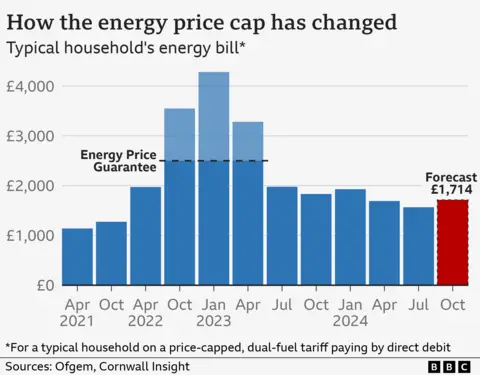 Getty Images
Getty ImagesBillpayers are expected to face a sharp rise in household energy prices after Ofgem announces its new price cap later.
The energy regulator will officially confirm the cap on default tariffs for the three months from October at 07:00 BST.
It is likely to announce a rise of about 9%, or £150, on the annual bill of a household using a typical amount of gas and electricity.
The cap affects the price paid for each unit of gas and electricity used in 28 million homes in England, Wales and Scotland.
Energy prices governed by the price cap have fallen twice this year – in April and July – but are set to move back up towards last autumn’s level in October.
Consultancy Cornwall Insight, which is widely regarded for its accurate predictions, said it expected a household using a typical amount of gas and electricity would pay £1,714 a year from October.
That would be a £146 a year rise compared with a current typical annual bill – the lowest for two years – of £1,568.

While prices are much lower than their peak, they remain well above pre-pandemic levels, and financial support from the government has either been wound down or is being cut.
The final cost-of-living payment was made to eight million people on means-tested benefits in February, and the new government has announced it will halt winter fuel payments for 10 million pensioners in England and Wales this autumn. The payment is a devolved matter in Scotland and Northern Ireland.
Some households are already in debt to their supplier and now face increased prices in the run up to winter.
Dame Clare Moriarty, chief executive of Citizens Advice, said the charity was bracing itself for a “challenging winter”.
“The price cap increase will see a wave of households tipped into debt, billpayers forced to make impossible decisions to make ends meet, and families worried about the impact the cold will have on their loved ones,” she said.
“Energy prices might be down from the peak of the crisis, but with many already in the red and the removal of previous support packages, there’s still no light at the end of the tunnel for those in desperate need.”
Standing charges under review
Although the price cap is changed every three months, it is illustrated by Ofgem in terms of an annual bill for a household using a typical amount of gas and electricity.
People in larger properties will tend to pay more overall due to higher energy usage, while those in smaller properties likely use less so pay less.
Standing charges, a fixed daily fee covering the costs of connecting to a supply, currently stand at at 60p a day for electricity and 31p a day for gas, although they vary by region.
Ofgem is currently considering whether to change the standing charge billing system.

How some pensioners can claim support
An estimated 880,000 low-income pensioner households eligible for pension credit currently fail to claim it.
The government says it is worth an average of £3,900 a year and claiming it can qualify people for other financial support such as winter fuel payments.
You can check your eligibility for pension credit via the government’s online calculator.
Information is also available on how to make a claim. There is also a phone line available on weekdays – 0800 99 1234.
Guide to benefits, when you qualify and what to do if something goes wrong, are provided by the independent MoneyHelper website, backed by government.
Benefits calculators are also run by Policy in Practice, and charities Entitledto, and Turn2us.
